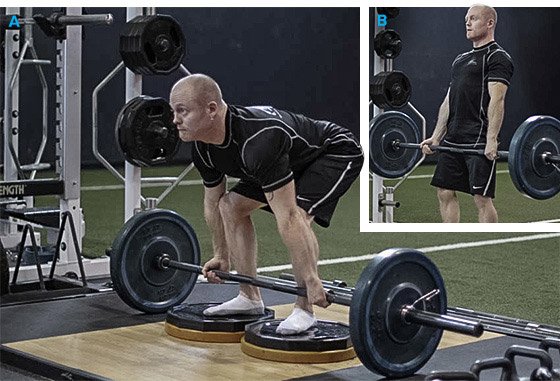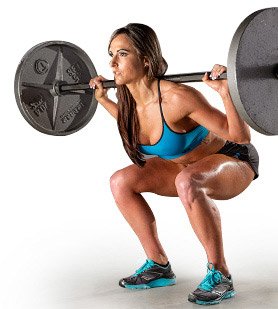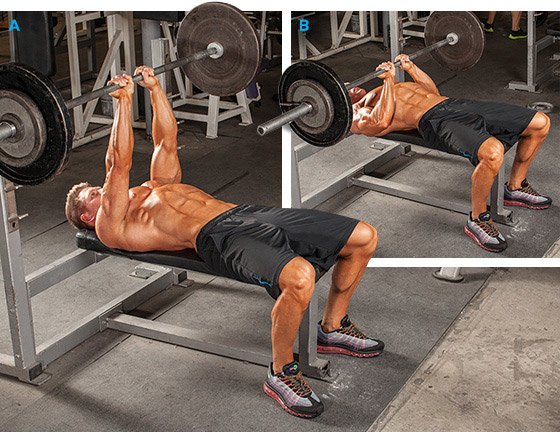When it comes to building muscle and strength, three exercises can kick sand in the face of pretty much any other move out there. I'm talking about "the big three" for getting big: the squat, bench press, and deadlift.
Unfortunately, performing these exercises endlessly can lead to stagnation—mental and physical—and once your brain hits the exit, your gains are likely to go on hiatus, too.
Sure, you could ditch these exercises for a while and embark on an entirely new program to shake things up, but these are awesome moves and gym staples for good reason.
So, I have plan that can give you the best of both worlds: the gains these exercises undeniably and inevitably produce, but enough variety to hold your interest, too. Try these variations after your basic sets for the big three exercises. It's as simple as that—and the resulting gains will amaze you.
The muscle-making and strength-building magic happens in three basic ways:
- You do more work than before, which leads to progress.
- Your body adapts neurologically, which leads to even more progress.
- Your work on the variations will improve your technique on the originals.
Check out these variations for each of the big three lifts, and learn how you can implement them to elevate your training and improve your physique!
1
Deadlift Variations
Complete your planned rep and weight scheme of deadlifts, and then try one of the following variations:
Deficit Deadlifts
This variation is for more advanced lifters and is designed to help increase the range of motion. Basically, elevate your feet 1-2 inches off the ground and pull from there. You can stand on top of 45-pound plates, use hard mats, or a short box.

Deficit Deadlift
When performing the deficit deadlift, I recommend dropping the weight by 10-20 percent. The set and rep scheme would be identical to that of your deadlift off the ground.
Romanian Deadlifts
Drop the weight 10-20 percent and perform 3-5 additional sets of 3-8 repetitions.
Block Pulls
Blocks pulls are not to be confused with rack pulls, which use the power rack. Placing the bar on the pins of a power rack takes any slack out of the bar and changes the lift drastically.
For a block pull, simply elevate the plates 1-4 inches off the ground by using mats, blocks, or even other 45-pound plates. Then either use the same weight as you did on your last set or add up to 10 percent to the bar.
Complete another few sets at the same number of repetitions you used for deadlift.
2
Squat Variations
Similarly, after crushing your regularly scheduled squats, you could work in one of these variations for getting out of particularly troublesome sticking points:
Pause Squats

Brutal is one way to describe the pause squat. Brutally effective, that is. A pause squat is just as it sounds: an ever-so-slight pause at the bottom, then bounce right back up.
I recommend dropping the bar weight by 10-20 percent and performing a few more sets at the same rep range this way. One to three seconds at the bottom more than suffices.
The paused position should be where you actively hold the weight up, not in the fully rested position. If you drop to the very bottom, you'd most likely engage the end range of your joints to create stability, but not so much your muscles to create the much preferred "active" stability.
Pin Squats
Try squatting from the pins. The pins change the nature of the exercise by removing the lowering (eccentric) portion. To set these up, move the safety pins in your squat rack so they hold the bar in a position where you are at or about 1-2 inches above parallel.
With the pins set and the bar loaded, dip yourself under the bar and into a proper position to squat the weight up. Maintain the same bar weight as you did for reps—keeping between 60-80 percent effort—except now perform only single reps.
3
Bench Press Variations
The bench press is a gym standard, but a few key variations can help push you past sticking points, should they arise. If you're keen on improving your bench press, try using one of the following:
Floor Press
Essentially a bench press from the ground, the floor press doesn't make the bench press any easier. Quite the opposite! The nature of the position nearly eliminates the drive of your legs and the arch of your back. The upshot is that this exercise will add productive volume to your upper body and contribute to an improved bench press.
To set up a floor press, simply move what are called the "J" hooks in your squat rack so they sit just low enough that you can un-rack the bar from a lying position on the floor.
From there, drop the bar weight by about 10-15 percent and perform a few more sets after the bench press, using the same number of repetitions you did with the standard bench press.
Paused Bench Press/Bench Press From Pins
The same guidelines as the pause squats or pin squats apply here. In this case, pause the bench press on your chest for the allotted time or set the safety pins about 1-2 inches above your chest.
Drop the bar weight by 10-20 percent and perform a few more sets at the same rep range with one of these two variations.
Close-grip Bench Press
Bring your grip a few inches closer together and perform the press with the same movement as normal. Just be extra careful about keeping your elbows tucked so they remain under this narrow hand spacing.

Close-grip Barbell Bench Press
Drop the weight by 10-15 percent and perform a few more sets of close-grip bench presses using the same repetition numbers as the standard bench press.
Now go out and give these a try!
Recommended For You

6 Things To Do With A Heavy Kettlebell
Somewhere in your gym, there's probably a heavy kettlebell with your name on it. Training with it doesn't have to be complicated. Just pick it up and try to hold on!
3 Rules For Effective Sandbag Training
Training with sandbags is catching on among a wide range of athletes. If you want strength and explosive power to help you rise to any challenge, step up to the bag!


TWEET THIS ARTICLE: "Did you know about these 8 amazing variations of squats, deadlifts, and bench presses?" #Fitness